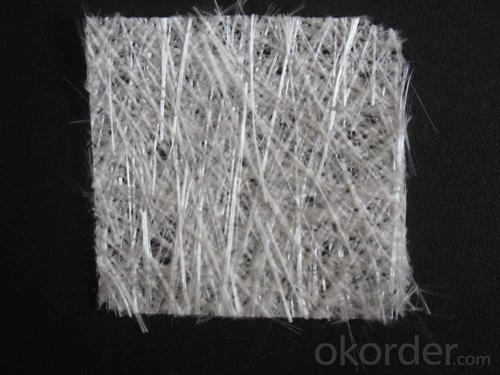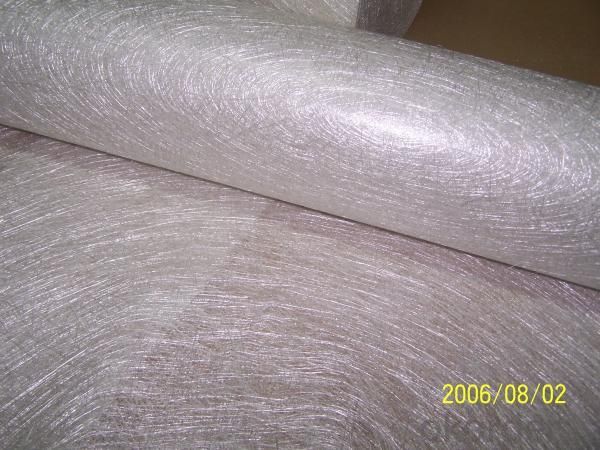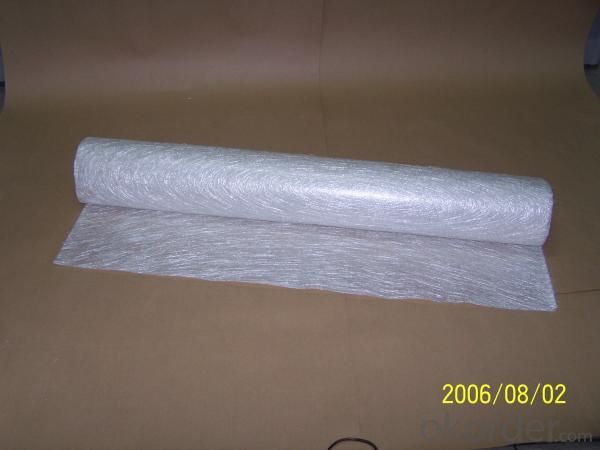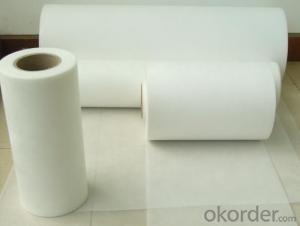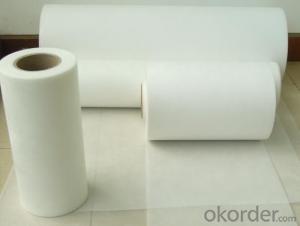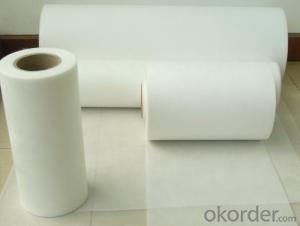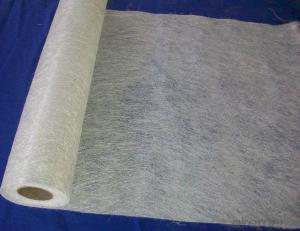Fiberglass Mat Tissue E-Glass CSM
- Loading Port:
- China Main Port
- Payment Terms:
- TT or LC
- Min Order Qty:
- 20Ton kg
- Supply Capability:
- 600TON PER MONTH kg/month
OKorder Service Pledge
OKorder Financial Service
You Might Also Like
Introduction of E-glass CSM
Type of glass: E-glass
Chopped Strand Mat is a mat with different GSM which made of fiberglass chopped strands with 50mm adding powder or emulsion binder. It is raw material to produce FRP products.
Specification of E-glass CSM
Width: 1m, 1.04m, 1.25m, 1.27m, 1.86m, 2m, 2.6m, 3m, 3.2m
Density:100g/m2, 200g/m2, 225g/m2, 300g/m2, 375g/m2, 450g/m2, 600g/m2, 900g/m2
Weight per roll depending on the different width:30kg, 35kg, 40kg, 45kg, 70kg, 80kg
Package of E-glass CSM
Packing:One 20' container can load about 10tons;One 40' HC can load about 23tons.
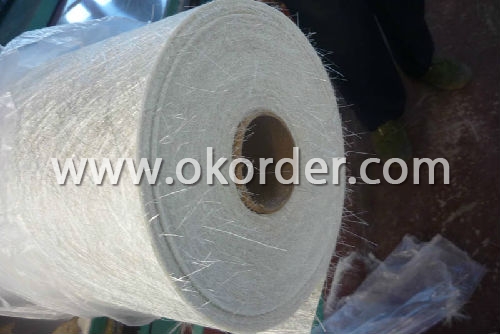
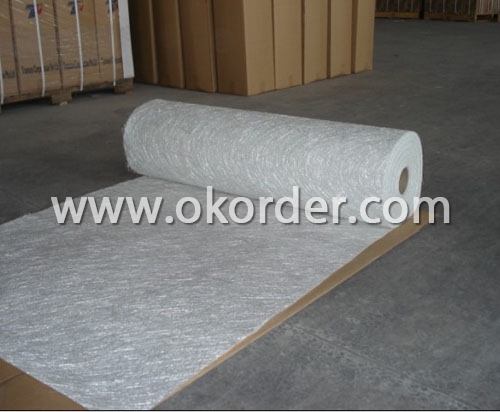
- Q: How does the fiber distribution of fiberglass mat tissue affect its strength?
- The fiber distribution of fiberglass mat tissue has a significant impact on its strength. The strength of fiberglass mat tissue is primarily derived from the fibers embedded within the material. These fibers provide reinforcement and help to distribute stress and load evenly across the surface. The distribution of fibers in fiberglass mat tissue refers to how the fibers are arranged and oriented within the material. If the fibers are evenly distributed, with a uniform arrangement and orientation, the strength of the fiberglass mat tissue will be enhanced. This uniform distribution allows for efficient load transfer from one fiber to another, leading to improved overall strength. On the other hand, if the fiber distribution is uneven or random, with fibers clumped together or oriented in different directions, the strength of the fiberglass mat tissue will be compromised. Uneven distribution can result in stress concentrations at certain areas, leading to weak points and potential failure under load. Furthermore, the fiber length and density also play a role in determining the strength of fiberglass mat tissue. Longer fibers provide greater reinforcement and improve the overall tensile strength of the material. Additionally, a higher fiber density, meaning more fibers per unit area, increases the strength and overall performance of the fiberglass mat tissue. In summary, the fiber distribution of fiberglass mat tissue directly affects its strength. A uniform and evenly distributed arrangement of fibers enhances the material's strength by facilitating efficient load transfer, while an uneven or random distribution compromises its strength by creating stress concentrations and weak points. Additionally, the fiber length and density also contribute to the overall strength of the fiberglass mat tissue.
- Q: Is fiberglass mat tissue resistant to mold growth?
- Yes, fiberglass mat tissue is resistant to mold growth. Fiberglass is made from glass fibers that are tightly woven together, creating a material that is highly resistant to moisture and mold. Additionally, fiberglass is non-porous, meaning it does not absorb water, which further inhibits the growth of mold. This makes fiberglass mat tissue an ideal choice for applications where mold resistance is important, such as in insulation, wallboards, and other construction materials.
- Q: How is fiberglass mat tissue used in the production of printed circuit boards?
- Fiberglass mat tissue is a commonly utilized reinforcement material in the production of printed circuit boards (PCBs). PCBs, consisting of copper layers, insulating materials, and fiberglass, are typically made in this way. The purpose of the fiberglass mat tissue is to provide structural support and mechanical strength to the PCB. Throughout the manufacturing process, the fiberglass mat tissue is saturated with epoxy resin, which forms a laminate material. This laminate is then combined with copper foils, serving as conductive pathways for the electrical signals on the PCB. The role of the fiberglass mat tissue in the performance and reliability of the PCB is crucial. It establishes a firm foundation for the copper layers, preventing delamination or warping due to mechanical stress or temperature fluctuations. Furthermore, it helps maintain the PCB's dimensional stability, ensuring its flatness and rigidity. Additionally, the fiberglass mat tissue enhances the PCB's resistance to heat and moisture. The epoxy resin used in the laminate provides excellent insulation properties, shielding the copper conductors from short circuits and electrical leakage. Furthermore, the fiberglass mat tissue acts as a barrier against moisture absorption, safeguarding the PCB from damage or malfunctions. In conclusion, fiberglass mat tissue is an indispensable element in the production of printed circuit boards. It offers structural support, improves mechanical strength, ensures dimensional stability, and enhances resistance to heat and moisture. Ultimately, the use of fiberglass mat tissue contributes to the overall reliability and performance of PCBs in various electronic devices.
- Q: Is fiberglass mat tissue compatible with vacuum infusion processes?
- Indeed, compatibility exists between vacuum infusion processes and fiberglass mat tissue. Frequently, fiberglass mat tissue finds application as a reinforcement material in composite manufacturing procedures, which encompass vacuum infusion. The vacuum infusion process encompasses the utilization of a vacuum to eliminate air and guarantee thorough impregnation of the fiberglass mat tissue with resin. The porous quality of the fiberglass mat tissue permits resin to pass through and thoroughly saturate the fibers, leading to the creation of a sturdy and long-lasting composite component. Consequently, fiberglass mat tissue emerges as an optimal selection for vacuum infusion processes.
- Q: Is fiberglass mat tissue suitable for aerospace applications?
- Yes, fiberglass mat tissue is suitable for aerospace applications. Fiberglass mat tissue is a lightweight material that exhibits excellent strength and durability, making it ideal for use in aerospace applications where weight reduction and structural integrity are critical. It is commonly used as a reinforcement material in composite structures and aerospace components such as wings, fuselages, and engine components. Fiberglass mat tissue provides high impact resistance, good thermal stability, and low moisture absorption, which are essential properties for withstanding the harsh conditions and extreme temperatures experienced in aerospace environments. Additionally, fiberglass mat tissue offers good electrical insulation properties, making it suitable for applications that require effective electrical shielding. Overall, fiberglass mat tissue is a reliable and widely used material in the aerospace industry due to its exceptional mechanical properties, lightweight nature, and ability to withstand the demanding conditions of aerospace applications.
- Q: How does fiberglass mat tissue compare to other reinforcing materials, such as carbon fiber or kevlar?
- Fiberglass mat tissue is a reinforcing material that offers several advantages compared to other materials like carbon fiber or Kevlar. While carbon fiber is known for its excellent strength and stiffness, fiberglass mat tissue provides a more cost-effective solution with good strength-to-weight ratio. It is also highly resistant to corrosion, making it suitable for various applications. On the other hand, Kevlar is popular for its exceptional strength and impact resistance, but it is generally more expensive than fiberglass mat tissue. Therefore, the choice between these reinforcing materials depends on the specific requirements of the project, considering factors like cost, strength, stiffness, and corrosion resistance.
- Q: Can fiberglass mat tissue be used for insulation in hot climates?
- Yes, fiberglass mat tissue can be used for insulation in hot climates. It has excellent thermal insulation properties and can effectively block heat transfer, making it suitable for use in hot climates to maintain cooler indoor temperatures.
- Q: Is fiberglass mat tissue suitable for insulation in pharmaceutical plants?
- Yes, fiberglass mat tissue is suitable for insulation in pharmaceutical plants. It is a commonly used material in various industries, including pharmaceutical, due to its excellent thermal insulation properties and resistance to moisture, chemicals, and fire. Additionally, fiberglass mat tissue is lightweight, easy to install, and can help maintain controlled environments, making it an ideal choice for insulation in pharmaceutical plants where maintaining proper temperature and cleanliness is crucial.
- Q: Can fiberglass mat tissue be used for insulation in power generation facilities?
- Yes, fiberglass mat tissue can be used for insulation in power generation facilities.
- Q: Can fiberglass mat tissue be used for interior decoration?
- Yes, fiberglass mat tissue can be used for interior decoration. Fiberglass mat tissue is a versatile material that can be used for various purposes, including interior decoration. It is commonly used as a reinforcement material for composite materials, such as fiberglass reinforced plastic (FRP), which can be used to create decorative elements like panels, wall coverings, and moldings. Fiberglass mat tissue is lightweight, durable, and has excellent strength and resistance to moisture and chemicals. It can be easily molded into different shapes and designs, making it a popular choice for interior decoration projects. Additionally, fiberglass mat tissue can be coated or painted to match any desired color or texture, allowing for a wide range of creative possibilities in interior design.
1. Manufacturer Overview
| Location | Zhejiang, China |
| Year Established | 1969 |
| Annual Output Value | Above US$ 150 Million |
| Main Markets | overseas companies in Hongkong, Canada, South Africa, South Korea, India, Italy, Singapore, France and many other countries and regions. |
| Company Certifications | ISO9001;ISO14001 |
2. Manufacturer Certificates
| a) Certification Name | |
| Range | |
| Reference | |
| Validity Period |
3. Manufacturer Capability
| a) Trade Capacity | |
| Nearest Port | Shanghai |
| Export Percentage | 40%-50% |
| No.of Employees in Trade Department | 21-50 People |
| Language Spoken: | English |
| b) Factory Information | |
| Factory Size: | Above 5000,000 square meters |
| No. of Production Lines | Above 5 |
| Contract Manufacturing | |
| Product Price Range | Average |
Send your message to us
Fiberglass Mat Tissue E-Glass CSM
- Loading Port:
- China Main Port
- Payment Terms:
- TT or LC
- Min Order Qty:
- 20Ton kg
- Supply Capability:
- 600TON PER MONTH kg/month
OKorder Service Pledge
OKorder Financial Service
Similar products
Hot products
Hot Searches
Related keywords



